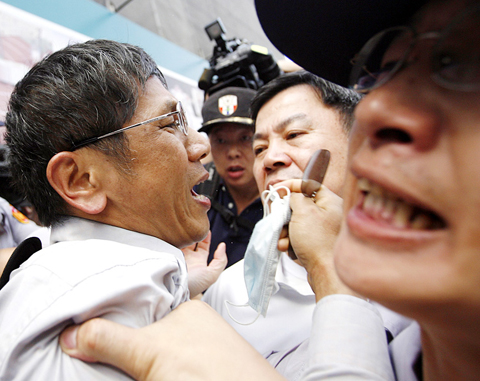Chinatrust Financial Holding Co (中信金控) yesterday expressed an interest in acquiring Nan Shan Life Insurance Co (南山人壽), a local subsidiary of the financially troubled American International Group Inc (AIG).
“We will place bids at the auction [to be organized by AIG] on July 3,” Charles Lo (羅聯福), chairman of the group’s subsidiary Chinatrust Commercial Bank (中國信託商銀), told reporters on the sidelines of the financial service provider’s annual shareholders’ meeting yesterday.
Lo said Chinatrust’s bancassurance channel would create synergies for both financial institutions if a merger went through since 96 percent of Nan Shan’s policies were traditional insurance products.

PHOTO: NICKY LOH, REUTERS
Among other potential bidders, Chinatrust will be competing head to head with state-run First Financial Holding Co (第一金控), which has also expressed an interest in acquiring the life insurance business for NT$60 billion (US$1.82 billion) by partnering with Aviva PLC to place a bid.
Nan Shan vice president April Pan (潘玲嬌) said yesterday that her company hasn’t been informed of such an auction and thus refused to comment on any market speculation, including whether parent company AIG had lowered the asking price for Nan Shan from NT$100 billion to NT$60 billion.
As of press time, AIG had not returned e-mails asking for confirmation of an auction.
Chinatrust Financial yesterday also reiterated its stance that it would shoulder its responsibilities over the sales of Lehman Brothers-linked structured notes after crowds of angry investors protested outside its headquarters in Taipei’s Xinyi District (信義) and chairman Jeffrey Koo’s (辜濂松) residence in Tianmu (天母), Taipei.
A representative from the Structured Notes Self-Salvation Organization (連動債聯合自救會) said that investors remained unsatisfied with the bank’s reimbursement of their losses.
In separate news, Taishin Financial Holding Co (台新金控) and Yuanta Financial Holding Co (元大金控) both held their annual shareholders’ meetings yesterday, and both vowed to expand their presence in China.
Taishin Financial chairman Thomas Wu (吳東亮) told investors that he was forced to sell off the company’s brokerage unit, Taishin Securities Co (台証證券), to KGI Securities Co (凱基證券) for NT$29 billion after the government disrupted its planned merger with Chang Hwa Commercial Bank (彰化銀行), in which Taishin Financial owns a 22.5 percent stake, worth NT$36.5 billion.
However, the company plans to set up or acquire a small brokerage by the end of this year and is in talks with several Chinese banks with regards to possible merger and acquisition opportunities, he added.
The company would cancel a plan to issue 450 million new shares because the sale of Taishin Securities had enabled the company to raise enough funds to improve its capital structure.
Taishin Financial also approved a proposal to reduce the company’s capital by NT$4.73 billion and write off last year’s losses, its press release said.
Meanwhile, Yuanta Financial chairman Yen Ching-chang (顏慶章) told shareholders that the financial service provider had not ruled out the possibility of transplanting its successful securities brokerage businesses into China.
The company said it would also look for potential opportunities to acquire rival brokerage firms.

In Italy’s storied gold-making hubs, jewelers are reworking their designs to trim gold content as they race to blunt the effect of record prices and appeal to shoppers watching their budgets. Gold prices hit a record high on Thursday, surging near US$5,600 an ounce, more than double a year ago as geopolitical concerns and jitters over trade pushed investors toward the safe-haven asset. The rally is putting undue pressure on small artisans as they face mounting demands from customers, including international brands, to produce cheaper items, from signature pieces to wedding rings, according to interviews with four independent jewelers in Italy’s main

Macronix International Co (旺宏), the world’s biggest NOR flash memory supplier, yesterday said it would spend NT$22 billion (US$699.1 million) on capacity expansion this year to increase its production of mid-to-low-density memory chips as the world’s major memorychip suppliers are phasing out the market. The company said its planned capital expenditures are about 11 times higher than the NT$1.8 billion it spent on new facilities and equipment last year. A majority of this year’s outlay would be allocated to step up capacity of multi-level cell (MLC) NAND flash memory chips, which are used in embedded multimedia cards (eMMC), a managed

In the wake of strong global demand for AI applications, Taiwan’s export-oriented economy accelerated with the composite index of economic indicators flashing the first “red” light in December for one year, indicating the economy is in booming mode, the National Development Council (NDC) said yesterday. Moreover, the index of leading indicators, which gauges the potential state of the economy over the next six months, also moved higher in December amid growing optimism over the outlook, the NDC said. In December, the index of economic indicators rose one point from a month earlier to 38, at the lower end of the “red” light.

The global server market is expected to grow 12.8 percent annually this year, with artificial intelligence (AI) servers projected to account for 16.5 percent, driven by continued investment in AI infrastructure by major cloud service providers (CSPs), market researcher TrendForce Corp (集邦科技) said yesterday. Global AI server shipments this year are expected to increase 28 percent year-on-year to more than 2.7 million units, driven by sustained demand from CSPs and government sovereign cloud projects, TrendForce analyst Frank Kung (龔明德) told the Taipei Times. Demand for GPU-based AI servers, including Nvidia Corp’s GB and Vera Rubin rack systems, is expected to remain high,